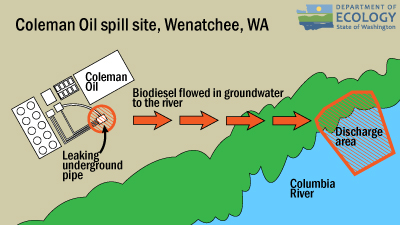WENATCHEE –
The Washington Department of Ecology fined Lewiston-based fuel retailer Coleman Oil $189,000 for spilling 3,840 gallons of biodiesel from a corroded underground pipe at its bulk oil plant in Wenatchee.
The fuel contaminated nearby soil and groundwater, and seeped into the Columbia River, creating a visible sheen that appeared off and on for more than a year. The property is now a toxic cleanup site.
Ecology cited Coleman Oil for negligence and not monitoring levels in the 20,000-gallon above-ground storage tank connected to the corroded pipe. Although Coleman Oil believed the underground pipe had been in place since 1935, the company did not follow its own inventory control procedures or industry guidance for buried piping.
“This spill happened over a long period of time and impacted the health of the river system,” said Dale Jensen, who manages the Department of Ecology Spills Program. “It could easily have been prevented if the company had been properly monitoring the fuel level in that tank.”
Ecology first responded to the site when the sheen was reported March 17, 2017. Its source remained a mystery until lab results came back identifying the pollution as biodiesel. Responders then traced the product to the Coleman Oil facility at 3 Chehalis St., near the river.
The company was cooperative throughout the spill response process and has worked with Ecology on cleanup under the provisions of the Model Toxics Control Act since October 2017. Groundwater monitoring wells are in place and are being sampled regularly to determine how much, if any, contamination remains in the groundwater. If fuel is found in the wells, it is being pumped out so it doesn’t reach the river. The next phase of the investigation is to find out if river sediments have been contaminated.
In addition to the fine, the company must reimburse the state $213,400 for its costs to respond to the spill. It is also faces a resource damage assessment, which may be an environmental restoration or enhancement project, or a payment into a fund that pays for such projects. The combined total of the state’s penalty, cost reimbursement and damage assessment are expected to total more than $1 million.
Funds collected from the penalty will go into the state’s Coastal Protection Fund.
Coleman Oil also faces a potential resource damage assessment from tribes.
Coleman Oil can appeal the penalty to the state Pollution Control Hearings Board.
Department of Ecology News Release - November 28, 2018


